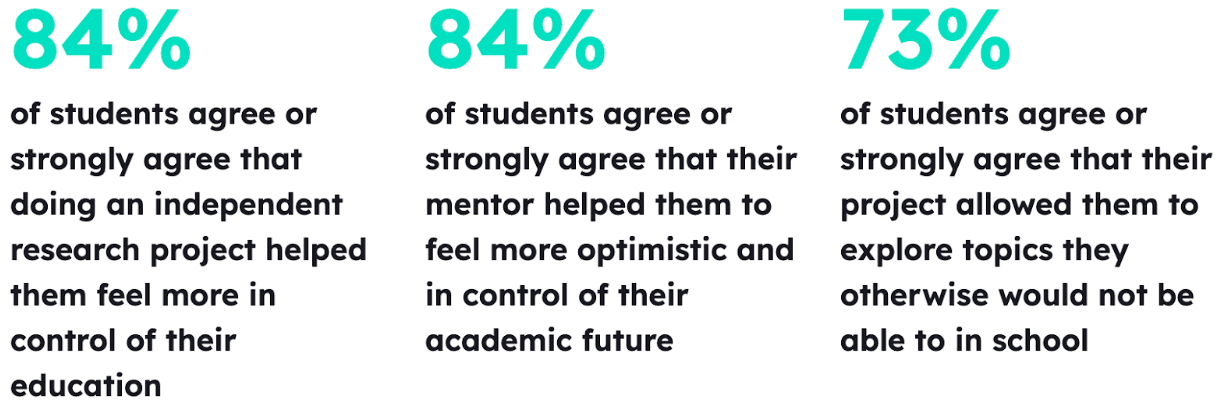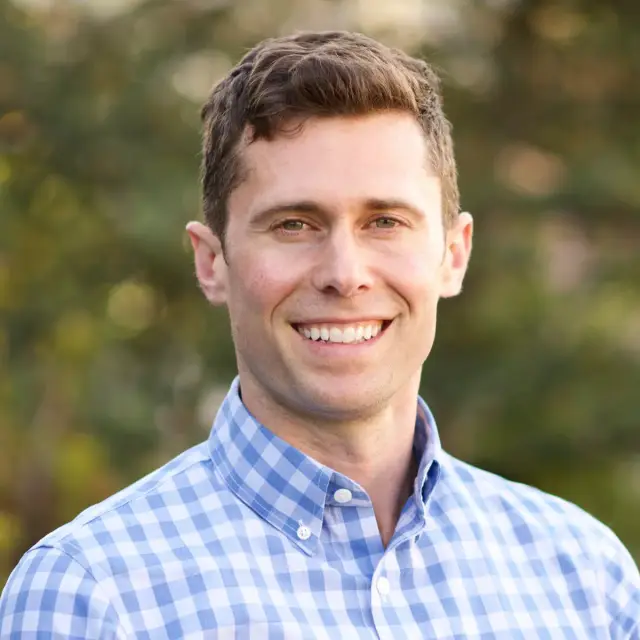Can Research Programs Improve Mental Health Outcomes for Students?
5 minute read
KEY TAKEAWAYS
Young people are experiencing an ongoing crisis of mental health.
Embracing passions and telling positive stories about ourselves is a proven way to combat emotional challenges and develop resilience.
Practicing self reflection by writing essays or building portfolios can help students find meaning beyond their academic achievements.
Among the core principles of research-based learning is empowering students with agency to define their path. In this article, and further in our White Paper, Paths to Resilience, we explore the role that these sorts of research and passion projects can have on student mental health.
The State of the Youth Mental Health Crisis
In January 2020, Yale’s Center for Emotional Intelligence and the Child Study Center released findings from a large survey of how U.S. students viewed high school. A large majority–nearly 75%–had negative feelings about their time at school, with most saying they were tired, stressed, and bored [1].
In hindsight, these findings may seem trivial next to the emotional and physical impact of Covid-19, especially for students. In October 2021, the American Academy of Pediatrics, American Academy of Child and Adolescent Psychiatry and Children’s Hospital Association jointly declared a “state of national emergency”[2]. Yet even though school has returned more or less to normal, levels of stress, anxiety, and depression amongst secondary students continue to rise [3]. A 2022 New York Times survey of school counselors found that nearly all of them (94%) reported that students were showing more signs of anxiety and depression than before the pandemic [4].
Student stress also seems to rise in inverse proportion to decreasing acceptance rates at top colleges. In 2011, a student applying to Ivies might have considered the University of Chicago a safety school with a 34.9% acceptance rate; its admission rate in 2023 was 5%.
The pressure to gain acceptance to a good college can turn academic life toxic; students from high-achieving schools “suffer from symptoms of clinical depression at rates three to seven times higher than normal" [5]. But even as schools try to provide more mental health support, most simply do not have the staff or resources to meet the need [6].
Giving Students More Control
Responding well to these changes is perhaps the definition of resilience, known in psychology as the process of adapting to adversity, trauma, tragedy, threats or significant sources of stress. And research has shown that building resilience depends in large part on mindset.
For her Polygence project on Coping during Covid-19, Isabel Wang explored the connection between internal and external locus of control and emotional coping—in this case, around the ups and downs of the COVID pandemic. The results, which earned Wang recognition as a Regeneron Science Competition winner found that students who exerted a high internal locus of control (i.e. the belief that they were in control of their own life outcomes) were ultimately able to cope better with the unpredictable nature of COVID better than those with a high external locus of control (i.e. the belief that the external world dictated their life and outcomes).
Do Your Own Research Through Polygence
Your passion can be your college admissions edge! Polygence provides high schoolers a personalized, flexible research experience proven to boost your admission odds. Get matched to a mentor now!"
Other research supports Wang’s findings. In a broad survey of students during lockdown, the research arm of the textbook and tutoring company Chegg found that 53% of high school students said they were “moderately,” “very,” or “extremely” worried about their mental health. One third reported experiencing depression, and almost a quarter (24%) said they knew of someone with suicidal thoughts [7]. As these numbers suggest, the external forces that dominated adolescent life during covid–from public health protocols, to changing school rules, the suspension of whole athletic seasons, restrictions on socializing, etc.–can severely erode internal LOC, and by extension our ability to cope with challenges.
It’s for good reason, then, that experts in curriculum design and administration have advocated for changes that put the power of decision back into the hands of students. Recent advice from Cathy Vattertot and the Association for Supervision and Curriculum Development endorsed, among other things, giving students “more autonomy in learning” and “control over their time" [8]. This advice is logical; for students to feel they control their future paths, they must have final say in which direction to go.
Michelle Terry, a licensed clinical psychotherapist, describes it this way:
“Parents always ask me, ‘What’s the number one ingredient to set my children up for success?’ I always say self-confidence...A strong sense of self and importantly self-confidence will empower young adults to find and nurture their passions. For me, there’s nothing better than watching my clients realize their full potential by acting on their passions and making a positive impact on others.”
Can Self-Guided Research and Passion Projects Improve Mental Health
Results from our research mentorship program at Polygence provides an example of how passion projects like these can also improve student emotional perceptions of school and their academic trajectories. Responses to a post-program Academic Outlook survey of more than 1,000 alumni indicated the experience made them feel more empowered and optimistic on several fronts.
84% agree or strongly agree that doing an independent project helped them feel more in control of their education, and the same percentage said (agree or strongly agree) that their mentor helped them feel more optimistic about their academic future. These sentiments are likely driven not just by personal connections but by the acquisition of tangible skills.
73% of Polygence alumni strongly agreed that their project let them do things they wouldn’t have had the chance to do in school.
88% found that things they learned on their independent projects would help or have already helped them succeed in college.

It’s worth noting that these students did not select specific courses or even follow predetermined curricula when working with mentors. They received no grades for their work and had flexible deadlines. Each topic was identified by the individual student as something they cared about and the development of the project revolved around their own goals and self assessment. While there are merits to other pedagogical models as well, empowering students to control their own explorations at appropriate times has many positive outcomes.
Indeed, for the majority of students, their project provided them an important sense of control, optimism, and personal connection. Polygence projects are student-driven—the topics are defined by the students in an area of passion, the progression of the project is oriented around the students’ goals, and the outcome is self-evaluated by metrics students arrive at in collaboration with their mentor.
Endnotes
1 Moeller, Julia, Marc A. Brackett, Zorana Ivcevic, Arielle E. White. “High school students’ feelings: Discoveries from a large national survey and an experience sampling study.” Learning and Instruction. Vol. 66. April 2020. https://doi.org/10.1016/j.learninstruc.2019.101301
American Academy of Pediatrics. “A declaration from the American Academy of Pediatrics, American Academy of Child and Adolescent Psychiatry and Children’s Hospital.” American Academy of Pediatrics. 19 Oct. 2021. https://www.aap.org/en/advocacy/child-and-adolescent-healthy-mental-development/aap-aacap-cha-declaration-of-a-national-emergency-in-child-and-adolescent-mental-health/
College students fare no better; numerous experts expect already critical levels of anxiety and depression among college students to continue to rise even as post secondary counselors are leaving the field at an unprecedented clip. See Kafka, Alexander C, ed. “Building Students’ Resilience: Strategies to support their mental health.” Chronicle of Higher Education. Nov. 2021, p. 16. https://store.chronicle.com/products/student-mental-health-new-challenges-new-solutions
Miller, Claire Cain, Bianca Pallaro “362 School Counselors on the Pandemic’s Effect on Children: ‘Anxiety Is Filling Our Kids’.” 29 May, 2022.
Luthar, Suniya S., Nina L. Kumar, Nicole Zillmer. “High-achieving schools connote risks for adolescents: Problems documented, processes implicated, and directions for interventions.” American Psychologist. Vol. 75, No. 7. Oct 2020, pp. 983-995.
Kafka, Building Students’ Resilience, pp. 15-19.
American Foundation for Suicide Prevention, Born this Way Foundation, The JED Foundation, Seize the Awkward. “COVID-19 and Mental Health: How America’s high school and college students are coping during the pandemic.” Chegg.org. Aug. 2020.
Vatterott, Cathy. “Lessons on Student Well-Being From “The Great Resignation’.” ACSD.org. Vol. 79, No. 9. 11 July, 2022.
https://www.ascd.org/el/articles/lessons-on-student-well-being-from-the-great-resignation
Your Project Your Schedule - Your Admissions Edge!
Register to get paired with one of our expert mentors and to get started on exploring your passions today! And give yourself the edge you need to move forward!
